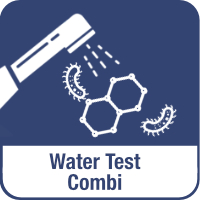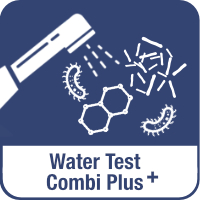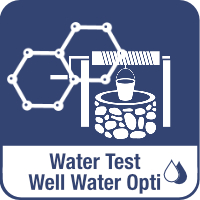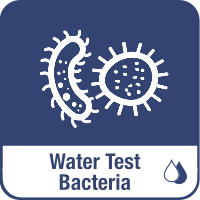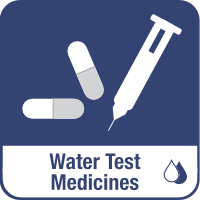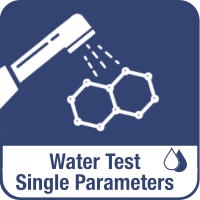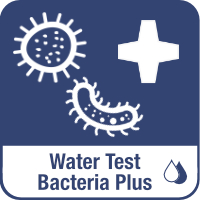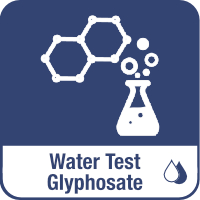1 franc per analysis for WfW
Umweltcheck supports water projects by WASSER FÜR WASSER (WfW)
ⓘThe order includes a sampling kit, a prepaid return label, and a detailed analysis report
Well Water Testing
Well Water Test: Reliably check the quality of your water with our analysis
With a well water test you can quickly and easily determine the quality of your well or spring water. Our proven test kits allow the detection of potential contaminants such as heavy metals, nitrate, nitrite, iron, manganese or bacteria and measure key quality parameters such as pH, water hardness, conductivity and turbidity. The professional laboratory analysis provides you with clear and easy-to-understand results.
✔ Heavy metals and pollutants
✔ For general drinking water, softeners
✔ Legionella, heavy metals and pollutants
✔ For general drinking water and softeners
✔ Heavy metals and contaminants
✔ Separate bacteria test recommended
✔ Focus on bacterial contamination
✔ For general drinking water, softeners
✔ 12 common pharmaceuticals
✔ e.g., diclofenac, ibuprofen
✔ Most common pesticides
✔ Glyphosate separate analysis
✔ Most affordable alternative
✔ More parameters available
✔ E. coli, coliform bacteria
✔ Enterococci
✔ Commonly used pesticide
✔ Possibly carcinogenic
✔ 20 common PFAS chemicals
✔ Per- and polyfluorinated alkyl substances
Get Your Results in Just 3 Steps

❶ You can easily order the test kit for the analysis here in our shop. Our water test kit will be conveniently sent to your home within a short time.
❷ You take the water sample yourself. Thanks to the detailed instructions, you do not need any previous knowledge. Now all you have to do is send the test kit to the provided address. In the laboratory, your sample is examined for all parameters of the test.
❸ Our experts will examine your sample in the laboratory. Afterwards, you will receive a comprehensive result that clearly explains all measured values with the help of graphics.
Get Your Results in Just 3 Steps:
❶ Order the analysis: Request the test kit and conveniently collect the sample yourself.
❷ Send the sample: Drop off the test kit with the return label at the post office.
❸ Receive your results: Clear and easy-to-understand analysis with detailed graphics.
Test your well water
Many homeowners trust well water, which is generally considered to be particularly pure and clear. In fact, the layers of soil through which the water seeps already act as an effective filter. Many pollutants are thus already removed from the groundwater in a natural way.
However, water from household wells often does not meet the requirements of drinking water regulations. There are various reasons for this:
In many regions, pollutants enter the water cycle through agriculture, environmental pollution, or fertilizers. Furthermore, contamination can occur due to defective filters or the entry of contaminated water into the well water. The material of the well pipes can also release pollutants into the water.
✔ With a well water test, possible pollutants can be identified quickly.
With well water tests from umweltcheck.ch, you can reliably determine important parameters. This helps you assess whether your well water is suitable for drinking. Thanks to the clear and detailed results, you can see at a glance whether the water in your submitted sample is of sufficient quality and whether it complies with the guidelines and limits of drinking water regulations.
Well water is generally considered to be clear and pure. The layers of soil already act as an effective filter through which the water seeps down into the groundwater. However, many wells do not meet hygienic requirements.
Possible reasons for contaminated well water:

- Natural occurrence of heavy metals in the soil layers
- Insufficient cover of the well
- Contaminated sites from industry, e.g. residues of chemicals, gasoline or oil
- Dirty pumps, water filters or pipes
- Outdated well system (shaft well)
- Unsuitable extraction points (hoses)
- Weather situation (flooding, heavy rainfall)
- Irregular maintenance and inspection of the well
- Obsolete pipes and lines – heavy metals can lurk here!
Chemical analysis – an advantage for your own well!
You can have a multitude of chemical values determined in our laboratory. These include nitrate, iron and manganese. The parameter nitrate is moving more and more into focus, as runoff from industry and agriculture can lead to considerable amounts entering the soil and groundwater. The current situation regarding nitrate in water leads to lively discussions. The more nitrate or other substances pollute the water, the greater the effort involved in obtaining clean drinking water or well water through filtration and treatment.
Both iron and manganese are less of a health risk (significant amounts would have to be consumed). However, technical systems can be impaired. Optical pollution (brown or black deposits and stains) are also a possible consequence of increased manganese or iron levels. Investigate specific chemical parameters and relevant toxic heavy metals to ensure safe and pure well water.
Easy sampling and fast results
Collecting a water sample is simple. You receive a sampling kit delivered to your home. Use it to take your well water sample yourself and send it to our laboratory in the prepaid return bag.
Once received, your water is analysed within a few working days. You get a detailed report with all relevant parameters, presented in an easy-to-understand way. If you have questions, our experts are here to help you interpret your results.
Order your well water test today and get certainty about your water quality!
Order Well Water TestWells in Switzerland
There are around 200 public fountains in the city of Basel alone. Public fountains are also popular in Zurich – more than 1200 fountains are available to the public here. Then there are numerous private wells.
If you have your own well, you should always be informed about the water quality. While public drinking fountains are regularly checked by the municipality, it is important for private well owners to take care of the water quality themselves.
A water test can provide information about heavy metal pollution, nutrient input and other important parameters.
Sources (in German):
https://www.zuerich.com/de/besuchen/1200-brunnen
https://de.wikipedia.org/wiki/Basler_Brunnen
https://naturwissenschaften.ch/service/news/117044-grundwasser-in-der-schweiz-ist-unter-druck

